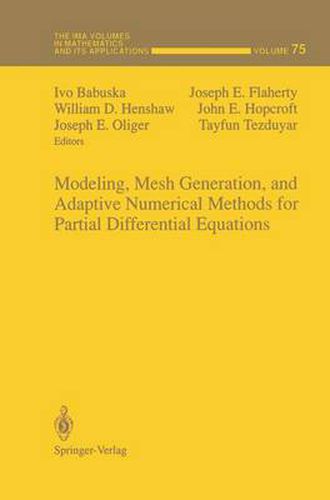Readings Newsletter
Become a Readings Member to make your shopping experience even easier.
Sign in or sign up for free!
You’re not far away from qualifying for FREE standard shipping within Australia
You’ve qualified for FREE standard shipping within Australia
The cart is loading…






This title is printed to order. This book may have been self-published. If so, we cannot guarantee the quality of the content. In the main most books will have gone through the editing process however some may not. We therefore suggest that you be aware of this before ordering this book. If in doubt check either the author or publisher’s details as we are unable to accept any returns unless they are faulty. Please contact us if you have any questions.
This IMA Volume in Mathematics and its Applications MODELING, MESH GENERATION, AND ADAPTIVE NUMERICAL METHODS FOR PARTIAL DIFFERENTIAL EQUATIONS is based on the proceedings of the 1993 IMA Summer Program Modeling, Mesh Generation, and Adaptive Numerical Methods for Partial Differential Equations. We thank Ivo Babuska, Joseph E. Flaherty, William D. Hen- shaw, John E. Hopcroft, Joseph E. Oliger, and Tayfun Tezduyar for orga- nizing the workshop and editing the proceedings. We also take this oppor- tunity to thank those agencies whose financial support made the summer program possible: the National Science Foundation (NSF), the Army Re- search Office (ARO) the Department of Energy (DOE), the Minnesota Su- percomputer Institute (MSI), and the Army High Performance Computing Research Center (AHPCRC). A vner Friedman Willard Miller, Jr. xiii PREFACE Mesh generation is one of the most time consuming aspects of com- putational solutions of problems involving partial differential equations. It is, furthermore, no longer acceptable to compute solutions without proper verification that specified accuracy criteria are being satisfied. Mesh gen- eration must be related to the solution through computable estimates of discretization errors. Thus, an iterative process of alternate mesh and so- lution generation evolves in an adaptive manner with the end result that the solution is computed to prescribed specifications in an optimal, or at least efficient, manner. While mesh generation and adaptive strategies are becoming available, major computational challenges remain. One, in particular, involves moving boundaries and interfaces, such as free-surface flows and fluid-structure interactions.
$9.00 standard shipping within Australia
FREE standard shipping within Australia for orders over $100.00
Express & International shipping calculated at checkout
This title is printed to order. This book may have been self-published. If so, we cannot guarantee the quality of the content. In the main most books will have gone through the editing process however some may not. We therefore suggest that you be aware of this before ordering this book. If in doubt check either the author or publisher’s details as we are unable to accept any returns unless they are faulty. Please contact us if you have any questions.
This IMA Volume in Mathematics and its Applications MODELING, MESH GENERATION, AND ADAPTIVE NUMERICAL METHODS FOR PARTIAL DIFFERENTIAL EQUATIONS is based on the proceedings of the 1993 IMA Summer Program Modeling, Mesh Generation, and Adaptive Numerical Methods for Partial Differential Equations. We thank Ivo Babuska, Joseph E. Flaherty, William D. Hen- shaw, John E. Hopcroft, Joseph E. Oliger, and Tayfun Tezduyar for orga- nizing the workshop and editing the proceedings. We also take this oppor- tunity to thank those agencies whose financial support made the summer program possible: the National Science Foundation (NSF), the Army Re- search Office (ARO) the Department of Energy (DOE), the Minnesota Su- percomputer Institute (MSI), and the Army High Performance Computing Research Center (AHPCRC). A vner Friedman Willard Miller, Jr. xiii PREFACE Mesh generation is one of the most time consuming aspects of com- putational solutions of problems involving partial differential equations. It is, furthermore, no longer acceptable to compute solutions without proper verification that specified accuracy criteria are being satisfied. Mesh gen- eration must be related to the solution through computable estimates of discretization errors. Thus, an iterative process of alternate mesh and so- lution generation evolves in an adaptive manner with the end result that the solution is computed to prescribed specifications in an optimal, or at least efficient, manner. While mesh generation and adaptive strategies are becoming available, major computational challenges remain. One, in particular, involves moving boundaries and interfaces, such as free-surface flows and fluid-structure interactions.